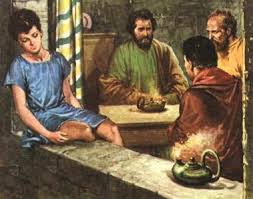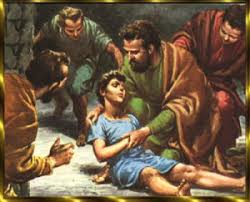Paul Raised Eutychus from the Dead at Troas
20: 1-12
56 AD
Paul raised Eutychus from the dead at Troas DIG: One reason for this trip was to collect money for believers in Judea (Romans 15:25-29). Why them might Paul want companions for this task (First Corinthians 16:1-4 and 2 Corinthians 8:16:23)? Why else might Paul want these Gentiles along for the presentation in Jerusalem (Chapter 15)? What can you learn about Paul and the church in Troas form this lengthy meeting? Peter raised a dead person in 9:40. Why would Luke tell a similar story about Paul? How many people did Yeshua raise from the dead?
REFLECT: Paul’s companions protect him from anyone accusing him of misusing the funds. How might Messianic communities, churches, and independent ministries of all sorts be helped by such accountability? How would this enhance unbeliever’s view of Christian integrity? Are you at all related to Eutychus? Do sermons put you to sleep? Or are you wide-awake spiritually? How can keep from falling flat on your face? Another interesting side of Paul, huh? After all the time we’ve spent studying his life, what do you find most inspiring about him? Most puzzling? Most interesting? Most refreshing?
Paul was ready for another journey. He wanted to make at least one more visit to the churches the Lord had helped him to found, because Paul was a man with a concerned heart. The care of all the churches was his great joy as well as his heaviest burden (Second Corinthians 11:23-28). After the uproar ended (to see link click Ch – Idol-Makers Start a Riot in Ephesus), Paul left Ephesus and headed toward Macedonia and Achaia (19:21). He expected to meet Titus at Troas and get a report on the problems at Corinth, but Titus did not come (Second Corinthians 2:12-13). The men finally met in Macedonia where Paul wrote Second Corinthians (Second Corinthians 7:5-7). Paul had originally planned to make two visits to Corinth (Second Corinthians 1:15-16), but instead he made one visit that lasted three months (Acts 20:3; First Corinthians 16:5-6). During that visit, he wrote his letter to the Romans.
The collection for the Messianic community in Jerusalem: Paul had two goals in mind as he visited the various churches. His main purpose was to encourage and strengthen the Gentile believers so that they might stand true to the Lord and be effective witnesses. His second purpose was to finish Jerusalem collection (Romans 15:25-27; First Corinthians 16:1-9; Second Corinthians 8 and 9). Paul had spent close to ten years soliciting those funds. This was a collection he took up among the Gentile churches to help Judean believers who were facing harder than usual economic times as a result of a famine during the late 40s. Paul and Barnabas made an initial famine-relief visit to Jerusalem in 46 AD and delivered a monetary gift from the church at Antioch (Acts 11:29-30). At that time the Judean believers expressed the hope that the Gentile believers associated with Paul would continue to remember them, which Paul was more than eager to do (Galatians 2:10). The collection effort was successfully completed in 57 AD (see Ck – Paul Went on to Jerusalem Despite Warnings). Paul viewed this as a symbol of unity that would help his Gentile converts realize their debt to the Messianic community in Jerusalem. The men who accompanied him (see below 20:4) were representatives of the churches, appointed to travel with Paul and help him handle the funds and provide security (Second Corinthians 8:18-24).475
Paul leaves Ephesus and stays three months in Greece: Then, Paul sent for the disciples at Ephesus; and when he had encouraged them to stand fast in the faith and said farewell. He informed them of his plan to leave, and then he departed to go to Macedonia. This summarizes about a year of ministry. When he had passed through those parts of Macedonia and given them a great word of encouragement, he came to Greece. There he spent three months, the winter months of 56-57 AD, while he wrote the book of Romans. At this point he became aware of a group of unbelieving Jewish leaders from Corinth who had been thwarted in their earlier attack on Paul (18:12-17). They had formed a plot to assassinate him as he was about to sail directly back to Syria (where Paul’s mother church at Antioch was). But this plot changed his mind and he decided to set off in the opposite direction and return to Syria on the overland route via Macedonia (20:1-3). That meant that he wouldn’t be able to celebrate the Passover in Jerusalem, but he did so in Philippi with Luke where the “team” agreed to rendezvous.
Paul did not travel alone to Yerushalayim for the collection to the Jews. It is noteworthy that Paul hardly ever travelled alone, and that when he was alone, he expressed his longing for human companionship, for example in Athens (17:15-16) and in his final Roman imprisonment (Second Timothy 4:9 and 21). That he favored teamwork is especially clear during his missionary journeys.476 The use of teamwork in ministry is a good example for us today. He was accompanied by Hellenistic representatives of the various Gentile churches he had founded to help him handle the funds and provide security. They were Sopater of Berea, son of Pyrrhus; as well as Aristarchus and Secundus of Thessalonica; Gaius of Derbe, and Timothy of Lystra; Tychicus and Trophimus (20:4). Sopater accompanied Paul only as far as Asia, and left the group for reasons unknown. But some of the others went with Paul much further. Trophimus went as far as Jerusalem (21:29) and Aristarchus followed Paul as far as Rome (Acts 27:2; Colossians 4:10).
The seven-man security detail went on ahead and were waiting for Paul and Luke at Troas. But we sailed from Philippi (where Luke joined him again) after the Days of Matzah, that is, after Pesach (see Bx – Paul’s Vision of the Man of Macedonia: A closer look at the “us” or “we” passages and sea passages). In is important to note that Paul, continuing to be the observant Jew (13:9), kept the Passover. In five days, no doubt due to the direction of the head winds, we came to them in Troas, where we stayed for seven days (20:5-6). Troas was another strategically placed city, where the congregation there seems to have been founded by Paul. He was in a hurry to reach Yerushalayim, if possible, for Shavu’ot (20:16).
Motza’ei-Shabbat in Hebrew means departure of the Sabbath and refers to Saturday after sundown. Now on the first day of the week, we gathered to break bread. By sharing and eating together, the church enjoyed fellowship and also gave witness of their oneness in Christ. Slaves would actually eat at the same table with their masters, something unheard of in that day.477 Sunday is never referred to as “The Lord’s day.” It is always referred to as the first day of the week. The context of these verses show it was nighttime and in Jewish reckoning, because the night precedes the day, the first day of the week was Saturday evening after sunset when it gets dark enough to see three stars. It would be natural for Jewish believers who had rested on Shabbat with the rest of the Jewish community to assemble afterwards to celebrate their common faith in Yeshua the Messiah. The Gentile believers who came later would join in the already established practice since many of them would have been God-fearers (10:2) already accustomed to following the lead of the Jews in whose company they had chosen to associate.478

Paul Raised Eutychus From the Dead: Paul was talking with them at length, intending to leave the next day (Sunday morning), so he prolonged his speech, going on and on till midnight. There were many torches in the large upper chamber where we were meeting, which would tend to stifle the air, depleting the oxygen. Now a young man (Greek: pais, he would likely have been between eight and fourteen years old) named Eutychus, meaning fortunate, was sitting in an open windowsill, gradually sinking into a deep sleep as Paul kept on talking. He probably had taken refuge in the window to catch a breath of fresh air, fighting drowsiness. That effort, however, brought disastrous results. Overcome by sleep, he fell from the third story and was picked up – dead (20:7-9). Luke was there, and being a medical doctor, and he would know.

Then Paul went down from the third floor, and like Elijah in First Kings 17:21 and Elisha in Second Kings 4:32-37, he fell on him and then threw his arms around him. He said, “Don’t be upset, for his life is within him” (20:10). This does not mean he only appeared to be dead, it means he was dead, but his life had returned only after Paul had ministered to him. Compare Peter’s raising Tabitha from the dead (9:40), and Yeshua. Our Lord raised four people from the dead. He raised Jairus’ daughter (Mark 5:22-43), a widow’s son in the town of Nain (Luke 7:11-15), His friend Lazarus (John 11:1-44), and Jesus raised Himself from the dead (John 2:21 and 10:18). Anyone claiming to have the gift of healing today, should be able to do the same. And one final thought, if we go to sleep during the sermon and die, there is no apostle to bring us back to life!
After he went back up to the third floor, resumed his teaching and broke the bread and ate the agape meal, then he talked with them a long while until daybreak. This was a second sermon that lasted even longer than the first one. And then he left only after finishing what he wanted to say. So they took the boy away alive, greatly relieved (20:11-12). They were more than relieved, they were more than comforted. They were encouraged and strengthened in their faith by what they had witnessed that night.
The Torah of ADONAI is perfect, restoring the soul. The testimony of ADONAI is trustworthy, making the simple wise (Psalm 19:8). Your Word, Lord, is a constant source of delight and renewal. So, today I thank You for filling me from the abundance of Your house and letting me drink from Your refreshing stream, for You are life’s fountain. In Your light I see light (Psalm 36:9-10). In Your Word, I find all I ever need, right when I need it.479



Leave A Comment